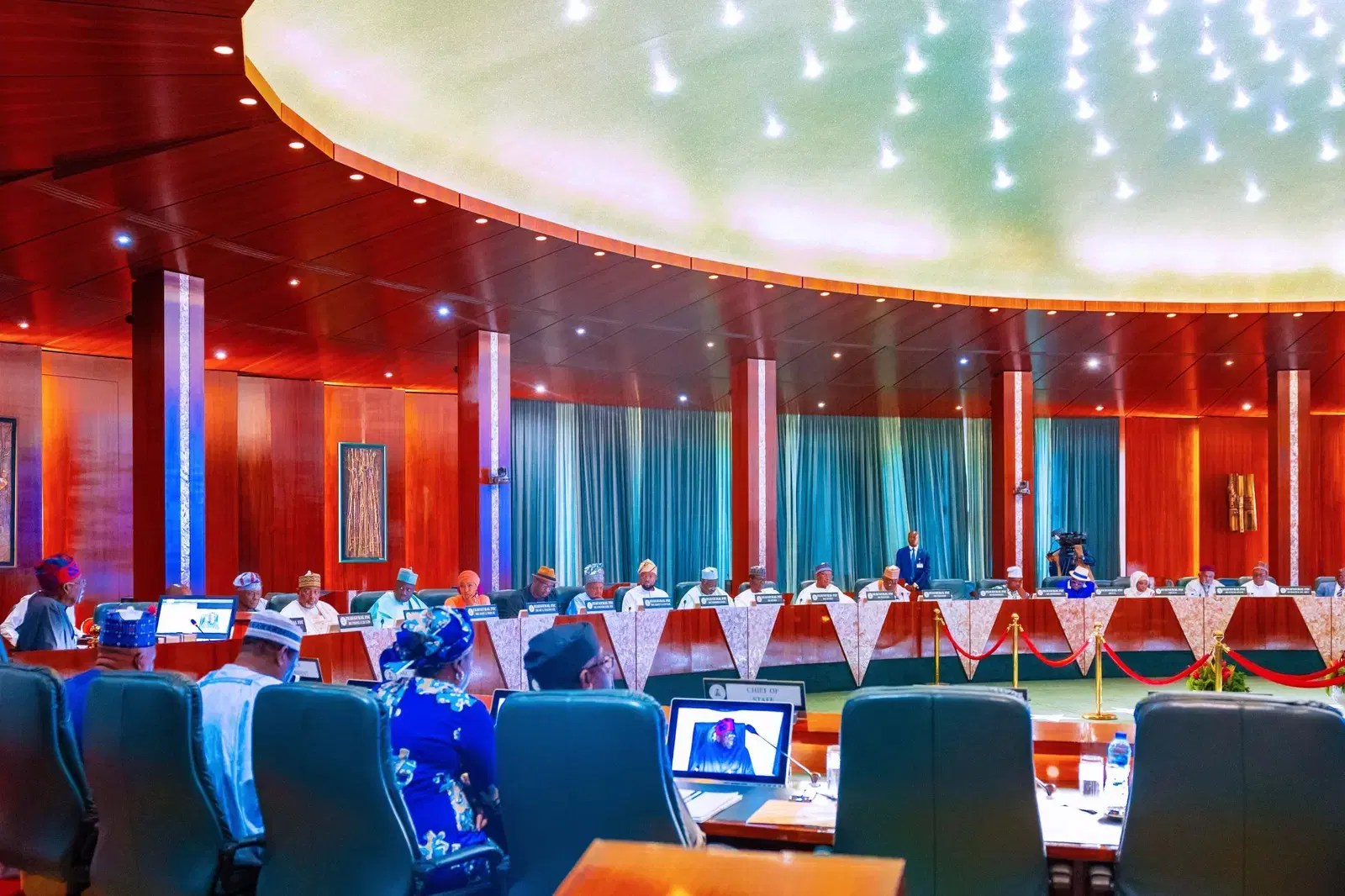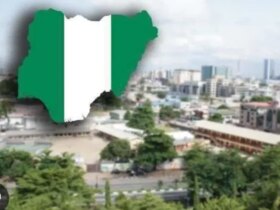Get an Exclusive First Look: Meet the New INEC Chair at Today’s Council of State!

By Jide Ajani, General Editor
LAGOS – Barring any unexpected changes, President Bola Tinubu is set to present his nominee for the chairmanship of the National Independent Electoral Commission (INEC) to the National Council of State today at the Presidential Villa, Aso Rock, Abuja.
Professor Mahmood Yakubu will conclude his tenure as INEC chairman next month. On Tuesday, October 7, 2025, he formally handed over his duties to the most senior National Commissioner, Dame May Agbamuche-Mbu.
Among the trio shortlisted to replace Yakubu, Professor Joash Ojo Amupitan emerges as the leading candidate, having garnered significant endorsements. His appointment is expected to follow the Council of State’s briefing.
A presidential source disclosed that Professor Amupitan, hailing from Kogi State in Nigeria’s North Central zone, has successfully cleared all security vetting procedures.
Currently the Deputy Vice-Chancellor (Administration) at the University of Jos, Amupitan was born on April 25, 1967, in Aiyetoro-Gbede, Ijumu Local Government Area of Kogi State. He is a Professor of Law specializing in Evidence Law, Corporate Governance, Corporate Law, and Privatisation Law, boasting a distinguished academic career.
President Tinubu’s method signals a departure from the approach of his predecessor, the late President Muhammadu Buhari, who delayed constituting the full four-member INEC quorum for four months, leaving the commission in limbo.
Decoding the INEC Appointment Process
The selection of INEC officials is governed primarily by Section 153(1) and the Third Schedule of the 1999 Constitution (as amended), which establish the commission’s framework.
Appointments are made by the President, contingent upon Senate approval, and require prior consultation with the National Council of State.
Both the Constitution and the Electoral Act outline the qualifications and neutrality expected of appointees.
Nonetheless, some of President Tinubu’s recent INEC appointments, including several National Commissioners and Resident Electoral Commissioners (RECs), were made without the constitutionally required consultation with the Council of State, although they have since been confirmed by the Senate and sworn in.
The Socio-Economic Rights and Accountability Project (SERAP) has criticized the President for appointing at least three individuals allegedly linked to the All Progressives Congress (APC) in key INEC leadership roles.
Insiders at Aso Rock confirm that President Tinubu has been deeply involved in the selection of the new INEC chairman.
However, conflicting reports suggest the President might postpone the official announcement of his nominee today.
Avoiding the Pitfalls of Former President Buhari
Assuming no last-minute alterations, President Tinubu aims to sidestep the controversy that overshadowed the conclusion of Professor Attahiru Jega‘s tenure in 2015 by appointing a substantive INEC chairman before the current chairman’s term expires. This is vital, given the difficulty in convening a National Council of State meeting.
On June 30, 2015, shortly after taking office, President Buhari created uncertainty by not immediately appointing a permanent INEC chairman following Jega’s departure.
In line with protocol, Jega had handed over to Ambassador Ahmed Wali, the most senior National Commissioner, to manage INEC’s affairs until a permanent chairman was appointed in consultation with the Council of State, as constitutionally required.
Yet, within 24 hours, Buhari disrupted this arrangement by appointing Mrs. Amina Bala Zakari, a relative, as acting INEC chairperson. The Head of the Civil Service, Mr. Danladi Kifasi, communicated this appointment effective June 30, 2015, pending the naming of a substantive chairman.
Both Wali and Zakari were National Commissioners, but Wali was senior to Zakari.
Despite Buhari’s electoral victory and the expectation that his transition team would have briefed him on urgent appointments, his choice of Zakari over the senior Wali raised eyebrows.
While Zakari’s credentials were not questioned, the familial link and bypassing of seniority sparked controversy.
This decision provoked widespread public backlash, with investigative journalism and civic activism ultimately preventing Zakari from becoming the permanent INEC chair.
It was only on October 21, 2015-nearly four months later-that Buhari appointed Professor Mahmood Yakubu as the substantive INEC chairman after extensive lobbying. Yakubu later oversaw the contentious 2019 and 2023 general elections.
The 2019 election was clouded by disputes over the presence of a server within INEC, while the 2023 polls faced significant challenges due to technical failures in the BVAS and IReV systems.
President Tinubu appears resolute in avoiding a recurrence of such disruptions during his tenure.
Tinubu’s Dedication to Electoral Credibility
Sources close to Aso Rock affirm that President Tinubu prioritizes the integrity of elections.
A confidant of the President noted, “His earlier proposal to involve NYSC members in the upcoming census was not just a cost-cutting measure but a deliberate effort to boost the process’s credibility.”
“Likewise, he is deliberate in choosing a successor to Professor Yakubu who will maintain public confidence in INEC.”
Vanguard has learned that Tinubu has been subjected to intense lobbying from powerful politicians proposing various candidates since last year.
However, the President has identified that some nominees were supported by interests aiming to manipulate INEC’s operations or secure lucrative contracts, often driven by financial motives.
The candidate pool included former national commissioners, RECs, and external figures. Throughout, the President has remained composed and discerning.
APC National Chairman Yilwatda’s Advisory Role
Vanguard also gathered that President Tinubu consulted the current APC National Chairman, Professor Nentawe Yilwatda, who served as Benue State’s REC from July 2017 to December 2021.
Renowned for his impartiality, Professor Yilwatda offered institutional guidance without unduly influencing the President’s decision.
An insider revealed that Yilwatda was cautious to avoid any actions that might be perceived as meddling in the selection of Yakubu’s successor.
What’s at Stake for President Tinubu
History remembers President Goodluck Ebele Jonathan for overseeing the 2015 general elections, widely praised as free, fair, and credible, earning him international acclaim as an election observer and mission leader.
Similarly, former Head of State General Abdulsalami Abubakar gained global recognition for successfully transitioning Nigeria to civilian rule in 1999 through credible elections.
Owu-born former President Olusegun Obasanjo is also celebrated internationally for his 1979 transition program that ushered in the Second Republic, a landmark moment when African military rulers handed over power to civilian governments.
These examples highlight the global importance of credible elections and the enduring legacy of leaders who safeguard electoral integrity.
President Tinubu’s challenge is to appoint a successor capable of matching the stature of a figure like Jega, similar to Ghana’s seamless transition from Kwadwo Afari-Gyan to Jean Mensa, who continued the former’s exemplary work.
New Party Registrations and Yakubu’s Early Exit
Recent reports suggest that the registration of new political parties by INEC may have hastened Professor Yakubu’s departure.
Sources reveal that Yakubu approved the registration of about a dozen parties out of over 110 applications, aiming to leave a lasting legacy at the commission.
Unbeknownst to him, one of these newly registered parties was intended as a fallback platform for a powerful politician planning to contest a governorship election in a South East state.
The incumbent governor of that state reportedly rushed to Abuja to voice concerns over this development.
Last month, Yakubu was directed to hand over to the most senior national commissioner, marking the start of his final exit from INEC.







